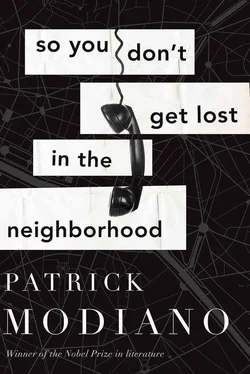Patrick Modiano
So You Don't Get Lost in the Neighborhood
I cannot provide the reality of events,
I can only convey their shadow.
STENDHAL
ALMOST NOTHING. LIKE AN INSECT BITE THAT INITIALLY strikes you as very slight. At least that is what you tell yourself in a low voice so as to reassure yourself. The telephone had rung at about four o’clock in the afternoon at Jean Daragane’s home, in the room that he called the “study”. He was dozing on the sofa at the far end, shielded from the sunlight. And these ringing sounds, which he had been unaccustomed to hearing for a long time, went on continuously. Why this insistence? Perhaps they had forgotten to ring off at the other end of the line. Finally, he got to his feet and walked over to the area of the room near the windows, where the sun was beating down too strongly.
“I should like to speak to Monsieur Jean Daragane.”
A dreary and threatening voice. That was his first impression.
“Monsieur Daragane? Can you hear me?”
Daragane wanted to hang up. But what was the point? The ringing would start again, without ever stopping. And, short of cutting the telephone cord permanently. .
“This is he.”
“It’s about your address book, monsieur.”
He had lost it last month on a train that was taking him to the Côte d’Azur. Yes, it could only have been in this train. The address book had probably slipped from his coat pocket just as he was taking out his ticket to hand it to the collector.
“I found an address book with your name on it.”
Written on the grey cover was: IF FOUND RETURN THIS NOTEBOOK TO. And one day, without thinking, Daragane had jotted down his name there, his address and his telephone number.
“I’ll bring it to your home. On whatever day and time would suit you.”
Yes, a dreary and threatening voice, for sure. And even, Daragane thought, the tone of a blackmailer.
“I’d prefer us to meet somewhere else.”
He had made an effort to overcome his uneasiness. But his voice, which he intended to sound detached, suddenly struck him as flat.
“As you wish, monsieur.”
There was a silence.
“That’s a shame. I’m very close to where you live. I should have liked to hand it over to you personally.”
Daragane wondered whether the man was not standing outside the building and whether he would remain there, waiting for him to come out. He had to be got rid of as quickly as possible.
“Let’s see each other tomorrow afternoon,” he said eventually.
“If you like. But it will have to be close to where I work. Near the gare Saint-Lazare.”
He was on the point of hanging up, but he kept his composure.
“Do you know rue de l’Arcade?” the other man asked. “We could meet at a café. At 42 rue de l’Arcade.”
Daragane jotted down the address. He recovered his breath and said:
‘Very well, monsieur. At 42 rue de l’Arcade, tomorrow, at five in the afternoon.”
Then he rang off without waiting for the other person to reply. He immediately regretted behaving in such an abrupt way, but he put it down to the heat that had been hanging over Paris for several days, a heat that was unusual for September. It emphasised his loneliness. It forced him to remain shut up in this room until sunset. And then the telephone had not rung for months. As for the mobile, on his desk, he wondered when he had last used it. He scarcely knew how it operated and frequently made mistakes when he pressed the buttons.
If the stranger had not phoned, he would have totally forgotten the loss of this address book. He tried to recall the names that were in it. The week before, he had even wanted to start a new one and had begun to compose a list on a sheet of white paper. After a short while, he had torn it up. None of the names belonged to people who had mattered in his life: he had never needed to write down their addresses and phone numbers. He knew them by heart. In this notebook there were nothing but contacts of a so-called “professional nature”, a few supposedly useful addresses, no more than about thirty names. And among them several that should have been deleted, because they were no longer current. The only thing that had bothered him about the loss of this notebook was that he had written his own name in it, as well as his address. He could, of course, not keep his promise and leave this person waiting vainly at 42 rue de l’Arcade. But then there would always be something unresolved, a threat. At a low ebb on certain solitary afternoons, he had often dreamt that the telephone would ring and that a gentle voice would make a date with him. He remembered the title of a novel he had read: Le Temps des rencontres . Perhaps that time of meetings was not yet over for him. But the voice he had just heard did not fill him with confidence. Both dreary and threatening, that voice. Yes.
He asked the taxi driver to drop him at the Madeleine. It was not as hot as on other days and it was possible to walk as long as one chose the pavement that was in the shade. He followed the rue de l’Arcade, deserted and silent in the sunshine.
He had not been in this vicinity for ages. He remembered that his mother once acted in a nearby theatre and that his father had an office at the very end of the street, on the left, at 73 boulevard Haussmann. He was astonished that he still remembered the number 73. But all this past had become so translucent with time. . a mist that dissipated in the sunlight.
The café was on the corner of the street that adjoined boulevard Haussmann. An empty room, a long counter with shelves built above it, as in a self-service store or a former Wimpy. Daragane sat down at one of the tables at the back. Would this stranger turn up for the appointment? Both doors were open, the one that gave onto the street and the one onto the boulevard, because of the heat. On the other side of the road stood the large building at 73. . He wondered whether one of the windows of his father’s office had not overlooked that side of the street. Which floor? But these memories drifted away like bubbles of soap or fragments of a dream that vanished on waking. His memory would have been livelier in the café in rue des Mathurins, opposite the theatre, where he used to wait for his mother, or in the close vicinity of the gare Saint-Lazare, an area he had known well in the past. But no. It would not have been. It was no longer the same city.
“Monsieur Jean Daragane?”
He had recognised the voice. A man of about forty was standing in front of him, accompanied by a girl younger than him.
“Gilles Ottolini.”
It was the same voice, dreary and threatening. He gestured towards the girl:
“A friend. . Chantal Grippay.”
Daragane remained seated on the bench, not moving, and not even offering to shake hands with them. They both sat down opposite him.
“Please forgive us. . We’re a little late.”
He had adopted a tongue-in-cheek tone, so as to put on a good front no doubt. Yes, it was the same voice with a slight, almost imperceptible, Southern accent that Daragane had not noticed on the telephone the previous evening.
An ivory-coloured skin, dark eyes, an aquiline nose. The face was slender, as angular at the front as it was in profile.
“Here’s your property,” he said to Daragane, in the same tongue-in-cheek tone that seemed to conceal a certain embarrassment.
And he took out the address book from his coat pocket. He placed it on the table, covering it with his hand, his fingers splayed. It was as though he wanted to prevent Daragane from picking it up.
The girl sat back slightly, as though she did not want to draw attention to herself, a brunette of about thirty years old, with mid-length hair. She was wearing a black blouse and black trousers. She glanced anxiously at Daragane. Because of her cheekbones and her slanting eyes, he wondered whether she was not of Vietnamese extraction originally — or Chinese.
Читать дальше












